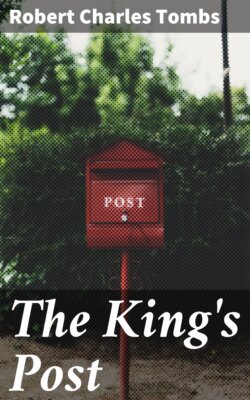Читать книгу The King's Post - Robert Charles Tombs - Страница 7
На сайте Литреса книга снята с продажи.
CHAPTER III.
ОглавлениеTable of Contents
ELIZABETHAN POST TO BRISTOL.—THE QUEEN'S PROGRESS, 1574.
Particulars are on record respecting a very early Post from the Court of Queen Elizabeth to Bristol. At that period it occupied more days for the Monarch to travel in Sovereign State to Bristol than it does hours in these days of Great Western "fliers." It seems that Queen Elizabeth made a Progress to Bristol in 1574. She travelled from London by way of Woodstock and Berkeley. She arrived at Bristol, August 14, 1574, and had a splendid and elaborate reception:—
"Before the Queen left Bristol she knighted her host, John Young, who, in return for the honour done him, gave her a jewel containing rubies and diamonds, and ornamented with a Phœnix and Salamander. She did not get quit of the city until after she had listened to many weary verses describing the tears and sorrows of the citizens at her departure, and their earnest prayer for her prosperity. From Bristol she travelled to Sir T. Thynne's, at Longleat, and from Longleat across Salisbury Plain to the Earl of Pembroke's, at Wilton, where she arrived September 3rd."
The British Museum records show that in 1580 Ireland was in rebellion. A Spanish-Italian force of eight hundred men had been sent, with at least the connivance of Philip II. of Spain, to assist the rebels, and the English Government was compelled to hurry reinforcements and supplies to Ireland. These reinforcements and supplies went by way of Bristol, and it was at that juncture of affairs that a post was established between London, or Richmond, where the Court was, and Bristol. This post, if not actually the first, was certainly one of the earliest posts to Bristol.
At a meeting of the Privy Council held September 26, 1580, a warrant was issued "to Robert Gascoigne for laying of post horses between London and Bristol, requiring Her Majesty's officers to be assisting unto him in this service." A warrant was also issued "to Sir Thomas Heneage, Knight, Treasurer of her Majesty's Chamber, to pay unto Robert Gascoigne the sum of ten pounds to be employed about the service of laying post horses between London and Bristol."
The duty of laying this post was not entrusted to the Master of the Posts, Thomas Randolph, but to Gascoigne, the Postmaster of the Court, who usually arranged the posts rendered necessary by Queen Elizabeth's progresses through her dominions. Gascoigne afterwards furnished an account of what he had done to carry out the Order of the Privy Council, and from this document, which is preserved at the Record Office in London, it seems that the post travelled from Richmond, or London, to Hounslow, and thence to Maidenhead (16 miles), Newbury (21 miles), Marlborough (16 miles), Chippenham (22 miles), and thence to Bristol (20 miles). The cost of the post for a month of 28 days is stated to have been £14 9s.; but it does not appear if this amount is in addition to the £10 ordered to be paid to Gascoigne for laying the post; nor is there anything to show how often the post travelled, or for how long it was maintained; Gascoigne describes it as an "extraordinary" post. At that time the only ordinary posts were from London to Berwick, Holyhead, and Dover respectively. It is, perhaps, as well to add that these posts were the Queen's posts, and were only intended for the conveyance of persons travelling on her service or of packets sent on her business, though other persons used the posts for travelling and for sending letters.
Several complaints were made by Leonard Dutton and another against Robert Gascoigne, Postmaster of the Court, in respect of abuses connected with the posts thus laid down for Queen Elizabeth's use while on a "Progress." The complainants charged Gascoigne with neglect of duty, laying posts to suit his own convenience, delaying letters, making improper charges, and stopping something for himself out of money he should have paid in wages, etc. Among the papers relating to this affair is a copy of part of Gascoigne's account, of which the following is a transcript:—
THE OFFICE OF THE POSTE.
In the office of William Dodington, Esquire, Auditor of Her Matie. Impreste, in the bill of accompt for Her Matie poste among other things is contained the following:
"Robert Gascoigne's bill for the laying of the extraordinary post on Her Majesty's Progress.
"Bristoll.—Thomas Hoskins and a constable entered post at Bristol for serving x. days begun xiij. of August until the xxij. of the same month, half days included, at ij.s. per diem.
"xx.s.
"Mangotsfield.—Philip Alsop and John Alsop, post at Mangotsfield for serving v. days begun the xviij. of August and ended the xxij. of the same month, half days included, at ij.s. per diem.
"x.s.
"Chippenham.—John Barnby and Leonard Woodland entered post at Chippenham for serving x. days begun the xviij. August and ended the xxvij. of the same month, half days included at ij.s. per diem.
"xx.s.
"Marlborough.—Thomas Pike and Anthony Ditton entered post at Marlborough for serving xvij. days begun the xviij. August and ended the third day of September, half days included at ij.s. per diem. "xxxiv.s. "Exd. per me Barth. Dodington."
As to the Marlborough post, Anthony Ditton was Mayor of the town, as appears from a certificate by him (which is with the papers) that he only received from Gascoigne 15s. for the posts. Gascoigne claimed to have paid at Marlborough 34s. (see the transcript of his account), and if Ditton was entitled to half that sum Gascoigne pocketed 4s. (£19 15s. 4d.). This is the sort of thing Ditton charged him with doing. To these charges Gascoigne gave a denial, separately explaining each charge. His explanation was accepted, inasmuch as he was continued in office.
